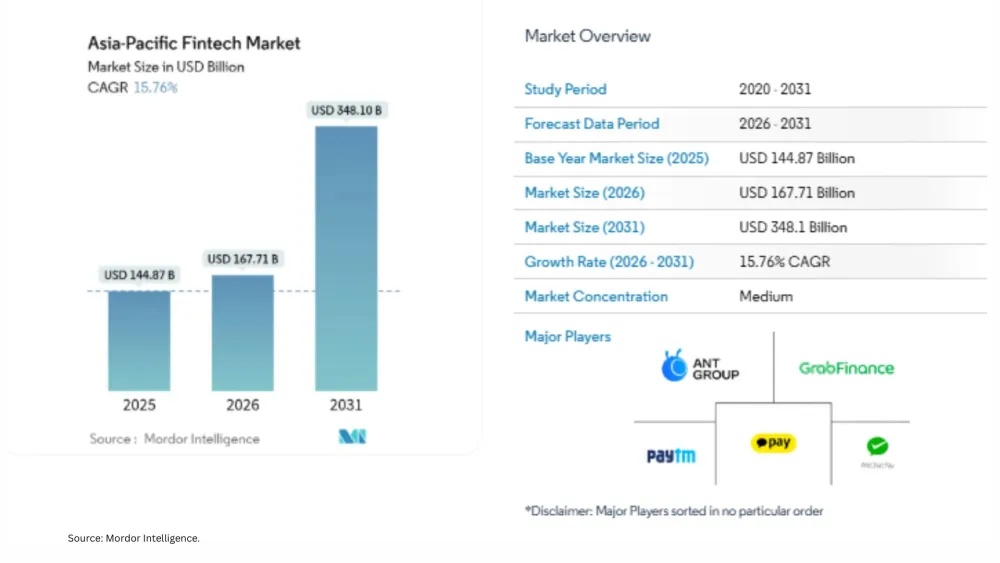
Singapore's fintech invasion has no end in sight
About 43% of fintechs in Southeast Asia choose Singapore as their home amidst strengthening growth prospects.
Singapore’s developed financial infrastructure and policy framework are its best weapons in luring fintechs, particularly those with plans to expand across ASEAN, Moody’s Investors Service said in a report. The city is attracting the largest share of fintech investments amongst ASEAN countries, branching out to areas such as wealth management, insurance and remittance services from digital payments and mobile wallets.
Also read: Singapore nabbed Asia's fintech crown from Hong Kong in 2017
The number of fintech ventures in Singapore increased by about 60% to 756 at the end of October 2018 from 479 at the end of 2017, according to data from UOB cited by Moody’s. By October 2018, Singapore accounted for the largest number of fintechs amongst ASEAN countries, home to 43% of those companies in the region, up from 39% at the end of 2017.
Equity investments in fintechs, including mergers and acquisitions (M&As), almost doubled in value to about $474.11m (US$350m) from 2016 to 2018. Whilst fintech-related investments and M&As in Singapore in 2018 were less than 2% of the total in Asia-Pacific, Singapore continues to be the top ASEAN nation in attracting new investments and entrants.

Prior to 2017, fintech investments in ASEAN were primarily for digital payments and mobile wallets as companies sought to take advantage of strong demand for such services amongst consumers with easy access to smartphones and the internet.
Kenny Liew, ICT analyst at Fitch Solutions, thinks that the payments market is currently saturated and interoperability remains a key issue. “A lot of mobile wallets and payment systems are engaged in cannibalising each other’s market share. This is beneficial for consumers, but continues to be loss-making for the payment operators,” he explained.
As the payments market matures, new fintech investments are increasingly flowing into emerging areas such as blockchain, online lending platforms, investment technology, robo advisory and artificial intelligence. Particularly, more than 30% of fintech funding in Singapore in 2018 was for technology development related to financing for small and medium-sized enterprises (SMEs) and wealth management services.
“The major banks and the government’s commitment to establishing Singapore as a ‘Smart Nation’ has all fed into the drive of establishing Singapore as a leading fintech player globally. The talent pool that Singapore has managed to develop during its expansion phase is also a lure for fintech firms. In addition, the favourable business conditions in terms of startup costs and lower taxation aid exponential growth opportunities,” Oriano Lizza, sales trader at CMC Markets, told Singapore Business Review.
Proactive regulators
Whilst regulatory requirements have been a key obstacle to fintech development globally, regulatory bodies in Singapore have treaded the fine line between supporting and restriction innovation in an effort to strike a balance between preserving financial stability and giving companies sufficient room to innovate.
Fintechs in Singapore have had success in areas with relatively light regulatory requirements, such as payments, whilst some new entrants are circumventing regulatory barriers through partnerships with banks. Regulators are also working on sandboxes to spur innovation in financial services and actively engaging with banks to test new technologies, which they believe is the safest way to boost competition, cut costs and increase lending.
At the same time, regulators continue to restrict fintechs from deposit-taking and lending to keep stability in the system. Such measures will keep fintechs' growth in check and help banks preserve their competitiveness. They are also expanding oversight of fintech companies. Under the Payment Services Act, implemented in February 2019, regulators have expanded their regulatory oversight to all service providers using payment systems. Importantly, fintech companies offering electronic wallets are prohibited from using wallet funds to make loans without a banking license. Previously, electronic wallets, payment account issuance, domestic money transfers and merchant acquisition services were not regulated.
It was in 2016 Singapore introduced Asia's first regulatory sandbox to ease initial regulatory requirements for fintech as they test the viability of their business ideas. This programme has since led to the creation of numerous fintech companies. Further, in November 2018, the Monetary Authority of Singapore (MAS) held a public consultation on the establishment of a pre-defined sandbox, dubbed “Sandbox Express,” which will allow fintech firms to start experiments more quickly, without going through the application and approval process under the current sandbox programme.
Lizza mentioned that two firms that have graduated through the sandbox initiative are PolicyPal, an insurance company which utilises AI to manage and optimise customers insurance portfolios, and Istox, which through the integration of blockchain have established a capital market to open up opportunities for young firms to gain access to capital and private investments
Amongst other various initiatives, Singapore is working toward enabling interoperability of payment systems, and both banks and fintech companies will soon be able to provide real-time fund transfers to any payment accounts in Singapore.
In September 2018, Singapore launched the Singapore Quick Response Code (SGQR) to consolidate multiple payment QR code platforms used by more than 27 operators of mobile payment services into a single system. This simplified the use of QR codes for payments and encouraged more consumers and merchants to adopt mobile payments.
Singapore is amongst the most advanced in the world in terms of implementing open banking, which uses application programming interface (API) technology to enable the sharing of banks' customer data with third-party companies, which will help banks work with fintechs to develop new digital products and services. Other government efforts include developing blockchain applications and improving cybersecurity. The government has also introduced initiatives to encourage private sector companies to develop their digital capabilities, whilst the MAS has signed partnerships with more than 29 regulators globally to promote cross-border collaboration in developing the fintech industry.
Foreign financial institutions also seek to take advantage of Singapore's vibrant fintech scene and well-developed regulatory framework. Since 2015, banks including Standard Chartered Bank, Bank of China, Deutsche Bank and Westpac Banking Corporation, as well as insurers and payment service operators, have established innovation labs or hubs in Singapore.



















 Advertise
Advertise














